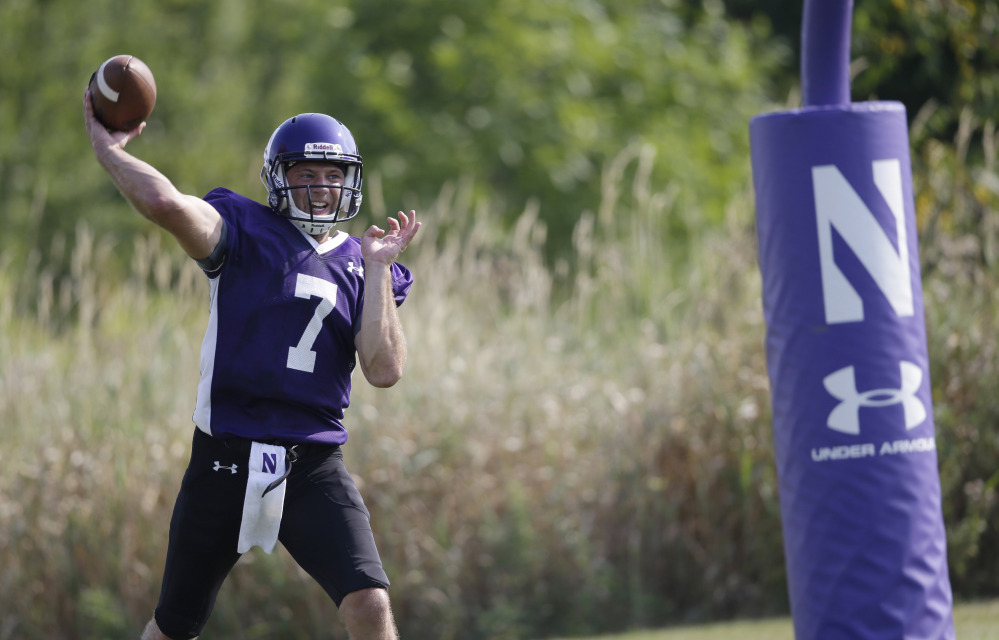The National Labor Relations Board halted the effort to unionize Northwestern’s football team without answering the biggest question of all: Are the players effectively university employees?
The five-member board instead tossed out the unionization effort Monday because “it would not promote stability in labor relations” to allow one school the ability to unionize while others — including public schools the NLRB doesn’t govern — could not.
“The board looks at these cases not just from a legal perspective,” said John Michels, who practices labor and employment law at the Chicago firm of Lewis Brisbois Bisgaard & Smith. “The board is there to promote labor peace.”
By failing to address the case’s primary issue, the NLRB prolonged the uneasy relationship between unpaid college athletes and schools that reap billions of dollars from their play. Warren Zola, who teaches sports law at Boston College, thinks that’s a problem that will need to be solved eventually.
“It seems to me they took the road that was easiest rather than what was right,” Zola said. “If your default was always, ‘This will cause labor strife,’ the pharaohs would still be ruling over the building of the pyramids.”
The NLRB ruling raises many questions. Here are some answers:
Q: The players argued that playing football was a job they aren’t fairly compensated for. Northwestern said they are students first. The players lost, so the board must have agreed with Northwestern and the NCAA, right?
A: Not exactly. The NLRB looked at the Bowl Subdivision, the top level of college football, and saw that only 17 of 125 schools are private; Northwestern is the only private school in the Big Ten. The board decided that allowing this one school to unionize would create a competitive imbalance and potentially destabilize college football.
“It’s simply going to create chaos,” said Michels, a former offensive lineman at the Air Force Academy and the son of a former Minnesota Vikings assistant coach.
Q: Are the Northwestern players angry?
A: Well, it’s not clear that the players even wanted to form a union. There was a vote taken in April 2014, but the school appealed before the ballots were counted and they were impounded. The ballots will now be destroyed since the unionization effort is considered moot.
“You don’t want to know how people voted,” Michels said. “You move to prevent even the possibility of some retaliatory conduct by (employers) figuring out who voted which way.”
Q: Does this mean any effort to unionize U.S. college athletes is dead?
A: No. The board said the case applied only to the Northwestern football team. It left open the possibility that other football players — or even other scholarship athletes in another revenue sport at Northwestern, like the basketball team — could form a union.
The board noted that the NCAA has recently taken steps to sweeten the pot for players, guaranteeing them four-year scholarships instead of one-year, renewable grants, for example. “Subsequent changes in the treatment of scholarship players could outweigh the considerations that motivate our decision today,” the board wrote.
Q: Why would that change things?
A: Athletes in a conference with no public schools — like the Big East in basketball — could make the case that unionization would not upset competitive balance. Or, if the NCAA further loosens its rules on athlete benefits, that could also convince a future NLRB panel that collective bargaining is appropriate.
“If there is more of a free market system … then allowing one school to negotiate a collective bargaining agreement with its players may not have as much an impact,” said Gabe Feldman, the director of the sports law program at Tulane University Law School.
Q: What’s the next step in the relationship between the NCAA and its athletes?
The NLRB ruling was a loss, but it is not the end of the fight for those trying to expand the rights of college athletes.
Antitrust lawyer Jeffrey Kessler has sued the NCAA and the five power conferences, seeking to eliminate any caps on player pay. And former UCLA basketball player Ed O’Bannon recently earned for players a right to a share of broadcast and licensing money.
“This is part of a broader fight for the rights of student-athletes,” Feldman said. “While this is a setback for the unionization efforts … there are other ways for student-athletes to improve their rights. That pressure seems to be increasing from all sides.”
Send questions/comments to the editors.


